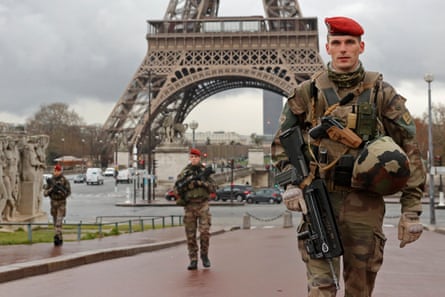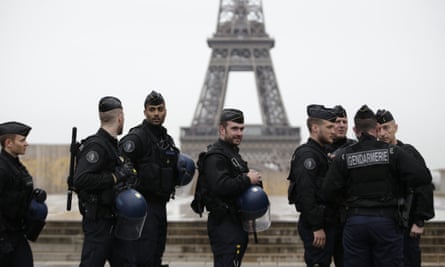On the cobbled alleyways of Montmartre, as a busker warbled La Vie en Rose and street artists painted watercolours of the view over Paris, Master Corporal Jean-Claude had been up since dawn leading a platoon of soldiers on patrol in full camouflage and flak jackets with fingers resting lightly near the triggers of their assault rifles.
“Our mission is to protect, dissuade and reassure,” he said in clipped tones, as his men from the 3rd Marine Infantry Regiment, normally based in Brittany, snaked past pavement cafes, tour groups and couples kissing, scanning all around for bombs or terrorists.
A young man leapt forward to ask for a selfie with the bizarre, yet now commonplace, sight of combat troops on the streets of Paris. “Sorry, rules don’t allow it,” said a senior officer who had spent most of his career serving in difficult war zones he was not allowed to name.
Children stared open-mouthed at the guns. Locals smiled and the occasional tourist came forward to ask for directions to famous landmarks. “I’m not from Paris but I’m slowly getting to know the place and I always try to help,” said a heavily armed junior soldier who grew up in rural Normandy.
After last year’s terrorist attacks on Paris, the president, François Hollande, declared that France was at war and swiftly saturated the streets of main cities with soldiers standing guard in full military fatigues to make people feel more secure. The now permanent presence of thousands of soldiers in khaki across the capital and major cities has transformed the image and mood of France.

Operation Sentinelle, in which combat troops patrol streets and protect key sites – from synagogues to art galleries, nursery schools to mosques and Métro stations – is the army’s first wide-scale peacetime military operation on mainland France.
Sentinelle was launched after the massacre at Charlie Hebdo magazine and a kosher supermarket in Paris in January 2015. But after November’s attacks that killed 130 people, Hollande increased the presence to 10,000 troops across the nation, with about 6,500 of them in the Paris area.
But while 79% of French people approve of Sentinelle in a country with a very positive view of its army, political opposition on the right and left has begun to question not the soldiers themselves but the government’s use of the military. Political commentators and ex-military figures have started to query whether deploying soldiers in what one rightwing senator called a mere security guard role is an efficient use of a highly trained – and now highly stretched – army.
The constant presence of camouflage uniforms everywhere from quiet neighbourhood streets to Métro carriages, patrolling past schools at home-time or milling through markets, has transformed the cityscape – and the relationship of the French to their soldiers. People now bring hot drinks and food offerings to men in military fatigues at the end of their street. The elite troops of the foreign legion are invited into a barmitzvah in a street of synagogues that they normally guard. There are now military medals for serving on the streets of French towns and many more young people applying to join the army.
“It’s quite hard to know what to tell children already traumatised and confused by the terrorist attacks,” said the concierge at one central Paris building in a neighbourhood where soldiers are regularly posted. “My five-year-old daughter would shush me and try to hide whenever she saw a soldier. I asked her why. ‘They’re the killers!’ she said. I told her they weren’t at all, but she just replied: ‘But they’ve got guns!’”
“Children do come up and talk to us a lot,” said Staff Sgt Stephane on patrol. “They ask us why we’re here, I say it’s to protect and reassure you. Then parents explain. We try not to hold our guns too high or too low.”
The French army, along with the British, is one of the biggest forces in Europe – it is deployed across the world, in operations ranging from Mali and the Sahel to Iraq, championed by Hollande, the Socialist who has been labelled “war chief” for his decision to intervene abroad. And yet Sentinelle is so vast that it is currently the biggest military operation in volume of any French operation anywhere in the world. Of all the French soldiers currently on military operations, half of them are deployed on streets at home.
In the senate last month, several opposition voices warned the political decision to put soldiers on the street raised problems. First there had been complaints that soldiers’ digs, particularly in Paris, had been at best rudimentary, at worst plagued with leaks, lack of heating and extreme hardship – conditions seen as commonplace in warzones abroad but at home seen as unacceptable.
The army has since acted to improve the accommodation, the problem being in part attributed to the lack of barracks space for soldiers who had not previously needed to be stationed in the capital. The former prime minister Jean-Pierre Raffarin warned that soldiers’ elite training and skills were not being fully used and others said they were losing valuable training time.
Most of the soldiers in Paris are deployed from across France and are spending increasing amounts of time away from home and family. “Thank goodness it’s the internet age. Imagine if we had to write letters home,” said one father of three on patrol.

Others have been more sceptical about whether or not the presence of soldiers around the capital could actually prevent determined terrorists from staging an attack. One general has likened the operation to the second world war Maginot Line, a defence line that German troops skirted round the edge of and dodged. The general pointed out that the presence of the military guarding key sites had not stopped the November attacks on random bars or the Bataclan concert venue, which were not on the special protection list.
Gen Vincent Desportes, a former director of France’s War college and now a professor at Sciences Po, told the Guardian that even before Operation Sentinelle the army had been overdeployed, warning that troops could now face burnout.
He said because of the high demand for patrols on home soil, “soldiers are not having rest time and are losing the collective training and savoir-faire”. He felt the benefit was negligible because soldiers simply standing guard were not being used to their best ability and Operation Sentinelle’s chief role was just as a political “anti-anxiety” measure.
But, in his office at the vast Invalides military complex in Paris, Col Benoît Brulon, spokesman for Operation Sentinelle in the Paris region, said the military operation was not just a psychological antidote for a worried nation. “It’s an operation like all the anti-terrorism measures, a combat measure. We’re engaged in a conflict, a war, in which we fight against terrorists. We’re not just here to be visible – even if that visibility helps the resilience of the nation.”
The operation has recently been adapted to make patrols less static, with soldiers moving across areas in a “less predictable” way and covering a wider area.
Bénédicte Chéron, a Sorbonne historian specialising in society’s relationship to the army, said French people’s view of Operation Sentinelle remained positive and there were very few anti-military movements currently, far less than would have been true 50 years ago when the legacy of the Algerian war was key. “Even amid the political debate about the efficiency of this military operation, French people don’t blame the army, instead they look negatively on the politicians’ role,” she said.

But Chéron said it would be politically difficult now for politicians to move to end the operation and “take the khaki off the street” when the terrorist threat is still there. Many believe France will have troops on home turf for a very long time.
In Montmartre, at his bar, Le Sabot Rouge, Henri Legourgue watched as the patrol passed outside. “We like them, we’re happy to see them. They’re part of the decor. They reassure tourists, and we lost a lot of tourists after the attacks.”
“Yes, but it won’t stop next attack, terrorists will always get round them,” shouted a man at the bar.
“Maybe, but I’m still glad they’re here for my customers,” Legourgue shot back.
